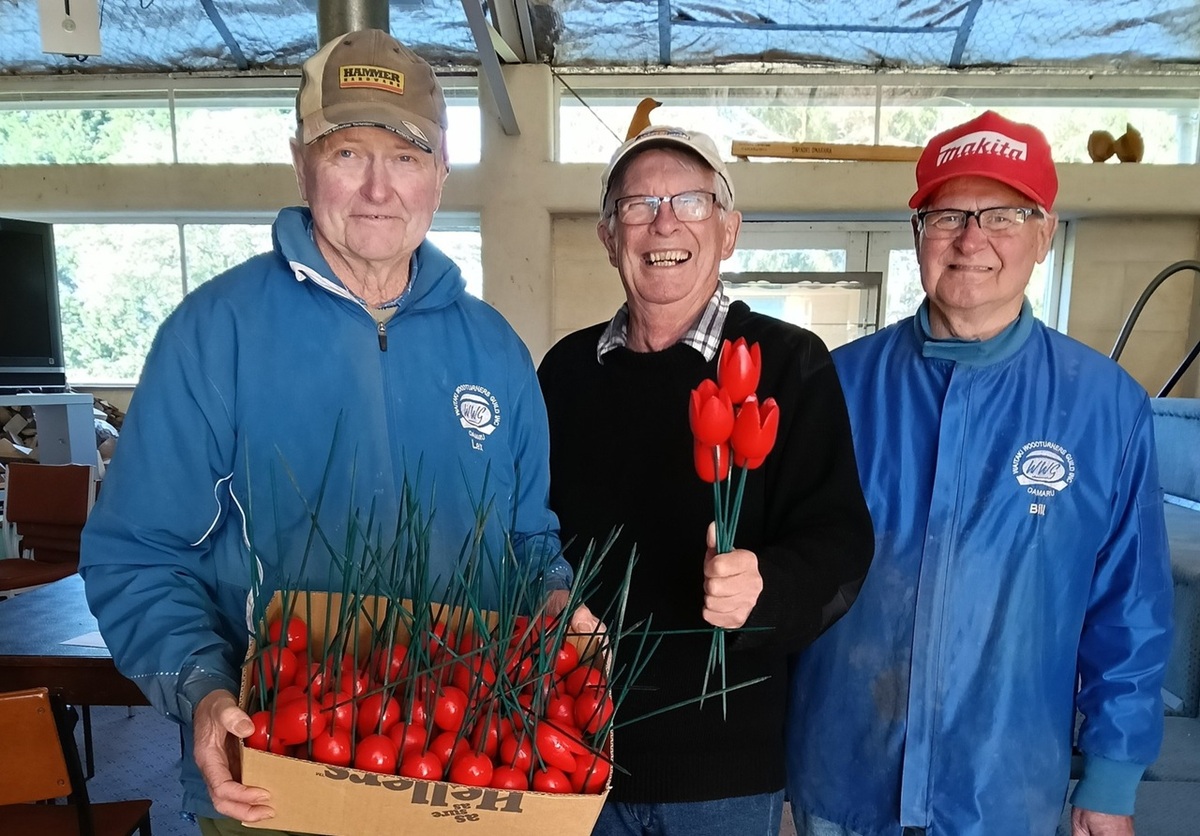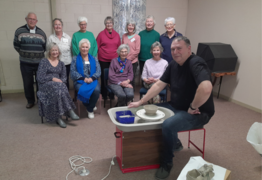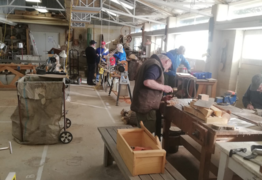Wooden tulips raise funds and awareness for Parkinson's in tough times
Ashley Smyth
10 June 2025, 10:56 PM
 Waitaki Woodturners Lex Young (left) and Bill Owen (right) with some red tulips ready to hand over to Parkinson's Red Tulip Action Group Otago chairperson Andrew Dunn (centre). Photo: Supplied
Waitaki Woodturners Lex Young (left) and Bill Owen (right) with some red tulips ready to hand over to Parkinson's Red Tulip Action Group Otago chairperson Andrew Dunn (centre). Photo: SuppliedWhen Andrew Dunn’s father was diagnosed with Parkinson’s disease, his family struggled to know where to go for information and support.
His experiences during this difficult time ultimately led to him co-founding Parkinson’s New Zealand in 1983, with the goal of providing people affected by the disease with high-quality information, education and support.
The group was initially 25 separate societies, and is now one large charitable trust, he says.
Andrew was last year named an Officer of the New Zealand Order of Merit in the King’s Birthday Honours, for his services to people with the neurodegenerative disease.
He was living in Wellington when the group was started, and moved south to Ōamaru in 2008, where he continues to dedicate himself to the cause, now as chairperson of the Red Tulip Action Group for Otago.
It is estimated around 12,000 people in New Zealand are living with Parkinson’s, a number which is expected to double in the next 20 years.
The condition is caused by the loss and degeneration of nerve cells which produce dopamine in the brain. Dopamine is important for the regulation of movement, and the loss of it results in slowed movements and tremors.
Other symptoms are changes in mood and cognition, low blood pressure and interrupted sleep.
Andrew says sometimes on receiving a Parkinson’s diagnosis, people will give up the things they love doing, which is the opposite of how they should respond, and can make the condition worse.
“So the two big things you need to do when you get Parkinson's is get your head around it, and get your hand around an exercise programme.
“Whichever state you're in. If you don't exercise, you need to start at some point,” he says.
Exercise is crucial for people with Parkinson’s as it significantly improves their quality of life and can slow progression.
Tulips are a symbol for Parkinson’s, the same way the daffodil is for cancer, he says. And an initiative to sell red wooden tulips as a fundraiser is a way to keep the issue front of mind.
Andrew says the idea of selling tulips began in Tauranga a few years ago and has now spread nationwide.
In Ōamaru, the flowers are made voluntarily by Waitaki Woodturners, and distributed across Otago. Parkinson’s New Zealand provides the paint.
They have become both a fundraiser and a conversation starter, he says.
“So, if I go down to the market on Sunday morning, I will take a bunch of these (tulips) and put them in a vase. It's a talking point.
“Parkinson's can be a difficult thing to talk about. You can see it, the tremor and so on, but it's not an easy thing to talk about because it's a progressive, degenerative, neurological disorder, and so it can be hard for carers to get their head around that, but they're doing their best.”
The initiative works, he says, and the tulips, which sell for $5, have raised more than $1200 for the Otago area so far.
“People don't usually buy just one. It’s ‘oh this would look good in a vase, I'll take three, I'll take five’ and away they go.”
Following a Parkinson’s diagnosis, support networks are important, along with social interactions and exercise.
The money raised by the group goes towards providing home visits from educators, phone and video support, advice, advocacy, and social activities, among other things.
While November is Parkinson’s Awareness Month, the tulips are available year round.
“These guys are making them all the time,” Andrew says. “And they just give me a ring every couple of months and say ‘we've done some more’.”
He admits there are only so many wooden tulips people need, so he tries to promote them every now and then, rather than all the time.
“You can get to a saturation point with the people that know about them. I mean, how many vases do you need? I get that.”
There are about 25-30 people with Parkinson’s in the Waitaki, and about 40 in the wider group here.
Andrew says his father was a minister, and diagnosed in his fifties. He retired early, due to head tremors.
“This is back in the eighties and . . . his doctor didn't know much about it. And the health department that I wrote to didn't. I was about 30.”
“There wasn't much in the way of information, so I met up with a guy and said: ‘What's going on? We need a support group for this. So we started one there, and then it grew over the years.
“We did a pilot, ran a pilot scheme for, we called them field officers back then. Now they call them educators.”
Educators began as nurses, but the costs added up, and so the title changed and any “health professional with some knowledge and understanding and community spirit” could put their hand up to help, Andrew says.
Waitaki did have two educators, but is now down to one, who is Timaru based.
Funding is becoming harder and harder to come by, Andrew says.
Parkinson’s New Zealand, which relies on grants, bequests and individual donations, missed out on a Lotteries Commission grant this year, for the first time. It is in the process of applying for Ministry of Health funding to supply more educators.
“So there's just less money going around . . . educators are not being replaced when they phase out,” he says.
If people are interested in buying a red tulip (or three) or making a donation to the Parkinsons Trust they can contact Andrew on 0274 658 733.
NEWS
WHAT'S ON GUIDE
TEAM MEET-UPS | LOCAL CLUBS & GROUPS CALENDAR






